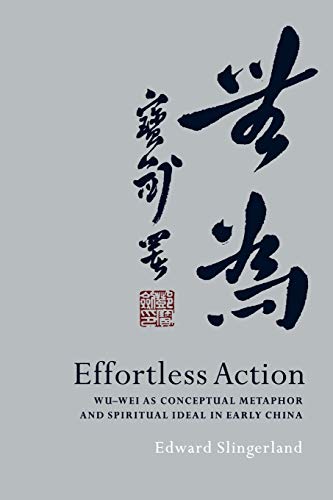Effortless Action
Wu-wei As Conceptual Metaphor and Spiritual Ideal in Early China
Edward Slingerland
BOOK REVIEW

In the intricate waltz between action and stillness, Edward Slingerland's Effortless Action: Wu-wei As Conceptual Metaphor and Spiritual Ideal in Early China emerges as an essential manifesto illuminating the depths of ancient Chinese philosophy. This masterpiece is not merely an academic exploration; it is a soul-stirring invitation to embrace a way of being that transcends the frenetic pace of modern life. Wu-wei, translated often as "effortless action," beckons us to abandon our incessant struggle and instead flow seamlessly with the currents of existence.
Slingerland's work is embedded deeply in the philosophical waterways of Daoism and Confucianism, exploring how wu-wei can serve as a metaphorical lens to understand human action and interaction. With painstaking precision, he unravels these rich traditions, revealing the interconnectedness of spontaneity and intention. The reader is compelled to confront a reality where success does not stem from relentless exertion but from the delicate dance of letting go and allowing life to unfold as it should.
This intellectual odyssey is bolstered by Slingerland's argument that wu-wei is not simply a passive resignation; rather, it embraces a profound engagement with the world. It encourages us to be active participants while simultaneously relinquishing the illusion of control. Can you feel the weight of your daily anxieties lifting, even for a moment, as you dive deeper into this philosophical pool? It invites a radical shift in perspective that is nothing short of revolutionary.
As you traverse the pages, consider how this ancient wisdom resonates with contemporary challenges. In a society gripped by competition and relentless ambition, Slingerland's insights serve as a clarion call to redefine success and achievement. Readers from diverse backgrounds have echoed similar sentiments, some finding solace in the philosophical underpinnings of their own life's turbulence. Critics, however, argue that Slingerland's treatment sometimes borders on oversimplification-can such a complex ideal truly be distilled into a single metaphor? Nevertheless, the power of his work lies in its ability to provoke thought and ignite a desire for deeper introspection.
The very essence of this book compels us to ponder who we are beneath our masks of productivity and success. It poses the daring question: What if our most productive selves emerge not from incessant doing but from the quiet embrace of being? The emotional tug of this realization is palpable. It beckons you to reflect on your own life choices-indeed, what would you release if you fully embraced effortless action?
In a world enamored with noise, Slingerland offers yet another voice-the voice of harmony found in silence. His exploration of wu-wei unfolds as a tapestry woven with threads of spirituality and practicality. The ancient teachings of Laozi and Zhuangzi are resurrected to challenge contemporary norms. Are we, as Slingerland suggests, neglecting the wisdom that has guided seekers for millennia? If you dare to shed the shackles of skepticism, you might find liberating truths that stretch far beyond the pages of this book.
Critics emerge from the shadows to debate Slingerland's interpretations, and yet, therein lies the strength of his thesis. Are we not, as seekers of knowledge, meant to debate, to grapple with ideas, to enrich our understanding through dialogue? As you delve into Effortless Action, you engage not just with Slingerland's words, but with a centuries-old lineage of thought that has shaped lives. The resonance of his insights may just stir something in the depths of your being, compelling you to explore how you might practically integrate wu-wei into your routine.
Ultimately, the challenge is not simply to read but to embody this philosophy in transformative ways. Slingerland's work opens a doorway to new realms of understanding, where we might redefine our personal narratives. Grab hold of this chance to consider how you could navigate your life with greater ease, empathy, and reflection. The world awaits your unique unfolding-one less burdened by the clamor of overexertion and more anchored in the wisdom of effortless living. 🌊✨️
Engagement with such profound ideas can evoke a range of emotions, from hope to frustration and back again. The duality of thought and action is the heartbeat of Effortless Action. How might you emerge from this exploration changed, armed with insights that challenge the status quo? The invitation is yours-embrace the art of wu-wei and find your flow.
📖 Effortless Action: Wu-wei As Conceptual Metaphor and Spiritual Ideal in Early China
✍ by Edward Slingerland
🧾 368 pages
2007
#effortless #action #conceptual #metaphor #spiritual #ideal #early #china #edward #slingerland #EdwardSlingerland